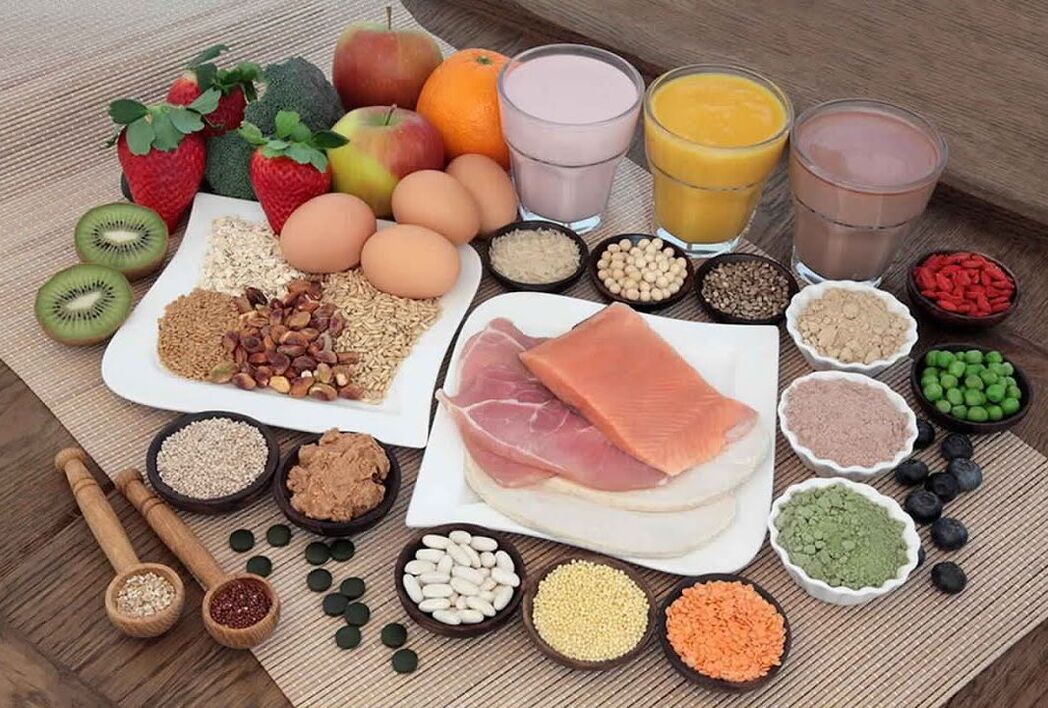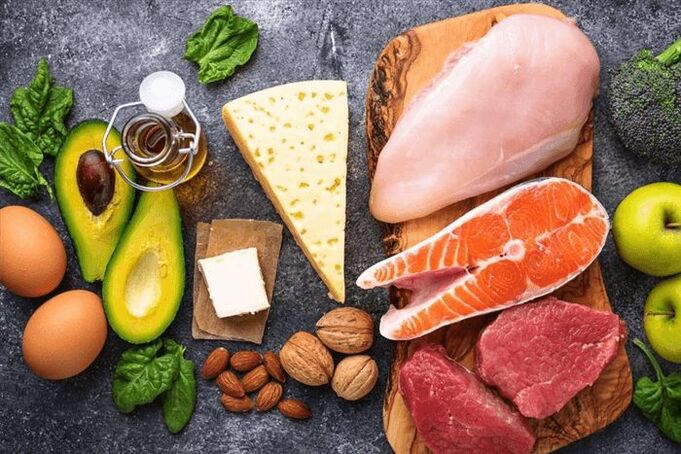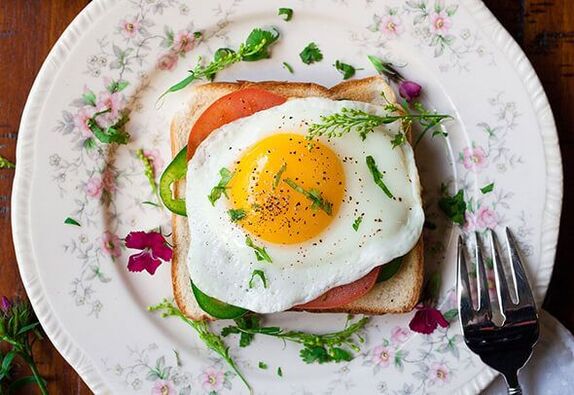First, let's try to understand what a protein diet is and what are its features. First of all, it is worth saying that this diet is based on a large consumption of protein foods: eggs, seafood, meat, fish, dairy products, various beans and grains. It is worth reducing the consumption of fat and especially carbohydrates to a minimum.
A lot of people think thatprotein dietquite difficult, however, it is not so. A big advantage is fullness with food, almost without restrictions. Now let's figure out which foods you should be eating in large quantities, as these will be your main diet.
What should you eat on a protein diet?
- Milk products
- Meat and fish
- Low-fat yogurts and fresh cheese
- Legumes
- Vegetables
- Sea food
Foods that should not be consumed on a protein diet:
- Fast food
- Sweet high-calorie fruit
- Baking and desserts.
- Potato
- Full-fat dairy products
- Fatty meat.
Why should you choose a protein diet for weight loss?
Proteins are the building material for our body, they contain a huge amount of vitamins, macro- and microelements. The problem for many people trying to lose weight is constant hunger pangs. On a protein diet, you will have enough energy and you will not constantly think about food. You will also not exhaust your body, it will look attractive, because muscle tissue will practically not be damaged. This is an excellent option for those who ultimately want to get a toned figure.
How does a protein diet work?
That's the pointdigestionand the body spends a huge amount of energy on digesting protein food. In order to digest lean chicken breast or egg whites, your body has to use its own reserves, which are fats. In those moments, a powerful process of losing weight begins. To achieve maximum results, it is worth adding at least a minimum of physical exercise.
No one talks about what you have to do all daydisappear in the gym, but half an hour circuit training at home will help enhance the effect of the protein diet.
Significant benefits of a protein diet. First of all, there is a wide variety of products that are available in many stores. You will not have a constant feeling of hunger, but you will be satisfied with food every time and enjoy it. You agree, even a lean piece of meat, cooked quite tasty, looks much tastier than the freshest leaf of lettuce or a green apple. There is a wide variety of recipes that are suitable for people who eat protein foods.
Many notice a significant advantage of the protein diet compared to others; over time, you may even get used to this diet, and the diet may become your way of life. Once you've lost a certain amount of weight, you'll be able to gradually add back your favorite foods without gaining weight. But it is always worth remembering that proteins should remain the main products of your diet.
Disadvantages of protein diet. Of course, every weight loss method has its disadvantages, but the protein diet has less disadvantages. The first and most important thing is that the products you have to eat often are not cheap. Seafood will cost you more than a bun or pie you can buy on the way to work. You will also have to spend a lot more time preparing food. It will not be easy for those with a sweet tooth, because the protein diet includes almost no desserts, except for dried fruits and fruits with a low fructose content.
You will need to carry containers that will last you all day, especially if you spend a lot of time at work or school. A protein diet means eating at least 5 times a day.

Basic principles of protein diet:
- Avoid high-calorie foods. It is necessary to exclude alcoholic beverages, fast food, pastries, sweets; dried fruit can be an analogue. Sweeteners should also not be present in your diet. Every food that ends up on your plate should be low in carbohydrates. Remember that even a small amount of sweetener in a cup of coffee can cause a strong appetite, resulting in overeating.
- Drink more water. This refers to pure water, not to various drinks in the form of coffee, tea or juices. When you are on a protein diet, you need to drink at least 2 liters of water a day. Carry a small bottle with you and keep refilling it, so you'll remember to take a few sips, even when you're not at home or at the facility.
- Minimize fat intake. If your diet contains fatty types of cheese, fatty fresh cheese, nuts or butter, consume them before lunch, so that the body will use up energy on time, and excess calories will not be stored as fat. Protein foods go well with cucumbers, tomatoes, broccoli and low-glucose fruits.
- Practice stress. In any case, you will need to supplement your protein diet with exercise. This way, you will achieve the desired result faster, speed up the metabolism, improve the absorption of protein food, and you will be able to burn more calories than you consume, which is the secret of healthy weight loss.
Who should think carefully about choosing a protein diet?
First of all, those who suffer fromdiseases of the gastrointestinal tract, as well as from kidney failure. A protein diet is undesirable for older people, because the body has to process a rather large amount of protein food, and if there are openings with the heart or blood vessels, that idea should be completely abandoned.
Sometimes when they are illiterateusing a protein dietblood clotting can change, and as a result there is a risk of blood clots. Therefore, do blood tests in advance and play it safe so that your weight loss does not turn into health problems.
Protein diet for weight loss

The time of sun, relaxation, airy clothes and bikinis is behind us. The beautiful ladies have already managed to relax a little, and even treat you to something very tasty and no less "very" high in calories. Undoubtedly, small joys make everyday life brighter and more positive. The main thing is to tell yourself to stop in time! Otherwise, the appearance of excess weight very quickly and, as the experience of losing weight shows, will bring uncertainty, negativity and problems into your life for a long time.
But what if time is wasted? How to quickly return to normal at home? Is a protein diet effective for every day?
Does perfect have to be perfect?
Before we talk about nutrition, let's understand if there is such a thing as an "ideal weight". The answer seems quite obvious, because the whole fashion and "healthy" industry of everyday life tells us about the need to meet certain standards of beauty and, it seems, health. Ideals that we did not invent and certainly have nothing to do with understanding human nature and the biological mechanisms of our functioning. Despite this, we are motivated in every possible way to strive for certain standards, to show results in the pool, gym, street jogging. The tragedy of the situation is that we do things that are very right for our bodies, not because they bring pleasure and benefit, but purely for compliance. We don't monitor our condition, we don't monitor the signals the body gives, we measure and weigh our body! And, as a result, we only make the situation worse.
Everyone is inspired, realized, ready to act, but where to start? And you have to start with your own definition of non-ideal weight. The same, individual for each of us, but causes the same feeling of discomfort and dissatisfaction.
What is a non-ideal weight?
Try typing in any search engine the query to determine your ideal weight and you will get links to dozens of calculators and tables. And none of them will consider:
- your heredity (genetic predisposition);
- the presence of chronic diseases;
- the number of fat cells in your body and their ability to store fat;
- metabolism (metabolism) in your body;
- your lifestyle – presence of stress, sleep and wakefulness, your mobility, quality and way of eating.
If you put it all together, it becomes clear that each of us has our own individual non-ideal weight. How to determine when it is time to act? If you have one or more of the following, your weight is far from your ideal weight:
Your weight has a negative effect on your health - your general state of health has worsened, you get tired faster, your joints and back are bothering you for the first time, you have shortness of breath, your blood pressure periodically rises, your bowel function leaves a lot to be desired;
weight begins to make unpleasant changes in your life. You cannot do the usual activities (everything that requires mobility and physical endurance), you have to limit yourself in clothes, you feel uncomfortable when you are in public transport or in crowded places, you start adjusting your life and work plans taking into account your weight.
Remember, if you're serious about taking care of yourself, start by seeing a nutritionist and endocrinologist. This will be the best thing you can do for yourself. Only experts in the field of medicine and proper nutrition, together, can help you maintain health and improve the quality of your life. Do not forget the need for constant physical activity in your life.

What is a protein diet?
How can you adjust your menu to lose those pounds that are preventing you from living life to the fullest? A high-protein diet can help in this - a diet based on protein-rich foods, as well as a significant restriction of carbohydrates and fats. With this way of eating, you can lose 14 kg within 3 months.
The basic principle of the protein diet is to eat food that contains proteins that regulate the metabolism in our body. In this way, it is possible to avoid the main drawback of any diet - a decrease in the intake of protein in the body, which, in turn, leads to rapid exhaustion of the body (the internal organs, which do not receive enough protein, begin to withdraw it from the muscle tissue). All this leads to weakness, poor physical health and loose skin.
Benefits of following a protein diet
The advantages that distinguish a protein diet from any other type of diet seem quite significant:
- maintaining a healthy muscular system;
- the ability to combine nutrition even with serious physical activity;
- inability to develop such a painful complication as anorexia;
- absence of exhausting, stressful feeling of hunger (protein food is absorbed by the body within 3-4 hours);
- Protein diet meals include a large amount of fiber, which ensures the smooth functioning of the intestines;
- due to rather slow, gradual weight loss, without much effort, it is possible to maintain the required weight after leaving the diet;
- good health - complete absence of weakness, dizziness and nausea, which are typical for other types of diets;
- flourishing appearance, true rejuvenation of the organism occurs - the condition of the skin, hair and nails improves.
It is important to remember that the maximum effect on the health of your body can be achieved only by following the rules of dietary nutrition in combination with physical activity, all organs and their systems must be trained.
Disadvantages and contraindications of protein diet
When you decide to rebuild your diet according to the principles of a protein diet, remember - ideal diets do not exist! Each diet is associated with certain restrictions or exceptions, which means that the burden on your body inevitably increases. It is precisely for this reason that we cannot help but mention the disadvantages of the protein diet.
The protein diet should be short-term. Long-term consumption of protein food leads to problems with the bone system (overconsumption of protein leads to leaching of calcium from the bone tissue, which makes the bones very fragile).
Long-term restriction of carbohydrate intake can negatively affect overall performance.
The nervous system is also attacked, which reacts to the lack of sufficient fat in the diet - the main material for the reproduction of nerve cells. The main signs of this condition are increased nervousness and irritability.
A long-term protein diet can disturb the balance of blood particles - the production of hemoglobin increases sharply.
Protein foods leave behind a large amount of "decomposition products", which leads to an increased load on the kidneys (to excrete them).
Protein diet menu
The protein diet menu should be built on the basis of several principles that guarantee the achievement of the necessary results (for example, weight loss by 10 kg):
Proteins make up at least 60% of the total diet.
Rejection of constant nibbling; for this purpose, preference is given to protein products with a long digestion cycle.
During the day, you should have at least 5 or 6 meals, and the gap between them should not be longer than 3 hours.
Avoid frying, all dishes should be prepared by baking, stewing or steaming.
To better balance your diet, you can include certain vegetables and fruits in your diet.
Regular physical activity on the body.

Chicken, turkey, veal, rabbit
Exceptions: lamb, pork (high fat content)
Lean fish
(not more than 4% fat)
Pink salmon, pollock, cod, navaga, perch, perch, grayling
Milk and fermented milk products no more than 3-5% fat
Kefir, yogurt, fresh cheese, hard cheeses
Rice, oatmeal, buckwheat
All "green" vegetables, like any other in small quantities, 2-3 times a week
Sour fruit drinks and unsweetened homemade compotes and juices (diluted with mineral water 1: 1), herbal teas and their infusions, unsweetened coffee
Olive, linseed, sunflower - in strictly limited quantities
Among the products prohibited for consumption, several main ones can be identified:
- flour products - pasta, pastries, bread;
- sugar and products and dishes containing sugar - pastries, ice cream, chocolate, sweets, ready-made juices, fruit drinks, etc. ;
- any sausages;
- Potatoes and dishes containing them;
- alcohol and all products containing alcohol;
- fast food and industrial semi-products.
Important! Regardless of which protein diet option you plan to use (short-term or long-term), remember that diet periods cannot be more than once every 6 months.
Protein diet: list of permitted foods and recommendations
During the protein diet, it is allowed:
- any meat - pork, beef, poultry with minimal fat content;
- seafood, eggs, low-fat cottage cheese;
- raw vegetables: cabbage, cucumbers, herbs, tomatoes;
- Lemon juice or olive oil is used as dressing;
- Oatmeal and buckwheat are allowed 2 times a week.
- sweets - here are all confectionery products (cakes, cookies), sugar and sweet fruit;
- bakery products, pasta, food fried in fat;
- cereals, potatoes, butter.
When following a protein diet, you must follow the following recommendations:
- you must eat 5-6 times a day, the last time no later than 2 hours before bedtime;
- drink at least 1. 5 liters of mineral water without gas or pure water per day;
- all alcohol is prohibited;
- If desired, it is allowed to eat a few citrus fruits or unsweetened apples for a snack.
What protein diet programs are there?
Many protein diet programs have been developed. There are pure protein diets and those with different variations: protein-vegetable, protein-fruit, protein-vitamin and others.
Protein diet for a week: menu options
Possibilities of a protein diet in 7 days
1 option
- Breakfast: 150 grams of beef with one whole grain bread, a cup of tea or coffee;
- Snack: 1 apple;
- For lunch: boiled chicken breast (150 grams) with vegetable salad (200 grams);
- Afternoon snack: 1 glass of low-fat yogurt or kefir;
- For dinner: boiled sea fish (200 grams) with vegetable salad topped with lemon juice.
Option 2
- Breakfast: 150 grams of low-fat cottage cheese, tea, coffee;
- Snack: 1 any citrus fruit;
- For lunch: stewed beef with vegetables (150 grams);
- Afternoon snack: 1 cup of low-fat kefir with dietary bread;
- For dinner: 200 grams of boiled lean fish with fresh vegetables.
Option 3
- Breakfast: boiled chicken fillet (200 grams), tea or coffee;
- Snack: 1 apple;
- For lunch: 200 grams of boiled beans with a portion of vegetable salad;
- Afternoon snack: 200 grams of low-fat yogurt with dietary cookies;
- For dinner: 150 grams of boiled beef with 150 grams of cabbage salad, seasoned with 1 tbsp. l. olive oil.
Option 4
- Breakfast: 1 glass of low-fat kefir with dietary cookies;
- Snack: 1 unsweetened fruit;
- For lunch: 200 grams of boiled chicken breast, 1 glass of apple juice;
- Afternoon snack: 1-2 boiled eggs;
- For dinner: 200 grams of boiled fish, 150 grams of fresh vegetables.
Option 5
- Breakfast: 150 grams of cooked turkey, 1 apple, tea or coffee;
- Snack: 1 glass of apple juice, 1 diet cookie;
- For lunch: boiled fish (200 grams) with a piece of whole grain bread;
- Afternoon snack: 1 glass of low-fat kefir;
- For dinner: 150 grams of boiled beef with vegetable salad.
Option 6
- Breakfast: 150 grams of low-fat cottage cheese and tea;
- Snack: 1 grapefruit;
- For lunch: beans stewed with vegetables;
- Afternoon snack: 1 glass of kefir;
- For dinner: boiled sea fish (200 grams) with fresh vegetable salad.
Option 7
- Breakfast: 1 glass of skimmed milk, 1 dietary cookie;
- Snack: 1 unsweetened apple;
- For lunch: vegetable soup with mushrooms;
- Afternoon snack: 50 grams of low-fat cottage cheese;
- For dinner: boiled beef (150 grams) with fresh salad.
Short-term (fast) protein diet option (3 days)
The main feature of such a "fast" protein diet is the complete absence of snacks, strict adherence to 3 meals a day and the prohibition of any, even the slightest physical activity. At the same time, it is allowed to drink unsweetened herbal teas between meals.
- breakfast - 1 boiled chicken egg, cooked in any form (hard-boiled, poached, etc. ), can be replaced with quail eggs, taking into account the calorie content;
- lunch and dinner – 150-200 grams of low-fat fresh cheese (no more than 3-5% fat) and tea without any sweeteners (the use of sugar and honey is unacceptable);
- liquid consumption - at least 2 liters per day;
- last meal no later than 6: 00 p. m.
When leaving the short-term protein diet, follow the principle of gradualness, in order not to harm your health, you must add foods and increase their quantity gradually, over 1-2 weeks. Start by adding grains and fruits, then add milk and fermented milk products (watch the fat content of the products).
Unfortunately, as much as we would like it, it is difficult to call such a diet balanced, during the period of a protein diet (especially a short-term one), the body experiences an acute lack of vitamins and minerals. To reduce the possible negative consequences of such restrictions, about a week before the diet, start taking vitamin complexes intended for long-term use (from 1 to 3 months).
When deciding on a fast protein diet, assess not only your current physical condition, but also the emotional and intellectual stress you may face during this period. Abandon the diet (or change it in time) if:
- you have recently suffered from a somatic illness;
- you are facing a period of severe physical, intellectual or emotional stress;
- you are over 50 years old;
- you have problems with the liver and/or kidneys, as well as with the cardiovascular system;
- you have (or currently have) blood clotting disorders (increased risk of thrombosis) and signs of diabetes.
And, of course, the use of any diet is absolutely not possible during pregnancy and breastfeeding.
If you want to schedule a menu for a protein diet for a long period, for example, a month, then it is better to contact experts. Not only will he be able to create a diet based on the allowed calorie content and the list of allowed foods, but he will make it as balanced as possible.
Dukan diet menu
The Dukan diet also refers to a type of protein diet, which according to the menu is divided into different phases: attack, cruise, protein-vegetable, consolidation, stabilization. The first phase of the attack is the most critical, here is its outline menu:
- For breakfast: an omelet of 2 egg whites with a little fat milk and some herbs.
- Snack: one and a half tablespoons of bran oatmeal.
- For lunch: 200 grams of boiled veal.
- Snack: cook 200 grams of shrimp or other seafood.
- For dinner: 200 grams of boiled veal or lamb.
results
As a rule, the effect of losing weight on a protein diet becomes visible within a week, when the first 4-5 kilograms of extra weight disappear..The most noticeable result will be after three weeks, when the excess weight will disappear even more, and muscle relief will become visible. After all, the protein diet is designed to get rid of fat deposits without losing muscle mass. Fortunately, there are enough protein products to restore and "build" muscle.
The higher the initial weight of a person losing weight, the more "losses" will be during the diet. For example, if you weigh 100 kg and are overweight, you can lose 5 - 10 kg in two weeks. At the same time, the diet is quite diverseand will not cause an aversion to a certain product, as happens in mono-diets.
It is believed that the optimal period when you can stick to a protein diet with benefits and without harm to health is 10-14 days. During this time you can lose 8-15 kilograms.

A real way out of a protein diet
Experts advise gradually abandoning each diet. The protein nutrition system is no exception. You should not immediately attack your favorite food, the consumption of which was prohibited during the program. It is better to completely exclude sugar and flour products from your diet.
Besides, you must continue to follow the regimen: eat at least 5-6 times a day in small portions, do not eat 2-3 hours before going to bed, drink more water and give up alcoholic beverages.
In the first 2 weeks after the protein diet, physical activity should be increased. This should be done in order to optimally use the incoming energy and maintain the result.
Contraindications
In order not to harm their health, it is better for people suffering from the following diseases to abandon the protein diet:
- hepatitis (and other liver diseases);
- arrhythmia (and other cardiac abnormalities);
- kidney dysfunction;
- dysbacteriosis;
- colitis;
- pancreatitis;
- increased thrombus formation;
- joint pain (and all related diseases).
Also, the protein nutrition system is not suitable for the elderly, pregnant and lactating women.

































